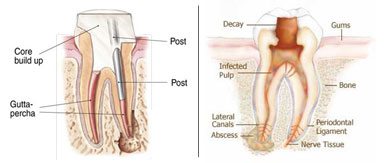SUV Dental Service
 Endodontics is a specialized type of dentistry that deals with abnormal tooth pulp; the causes/origins, diagnosis, prevention and treatment of diseases and injuries to the pulp; and other conditions affecting the tissues surrounding the pulp and canal (channel inside the tooth root). Tooth pulp, the soft tissue that contains nerves, blood vessels and connective tissues, runs through the hard tissue inside the tooth (dentin) and extends from the crown (top) of the tooth down to the tip of the root in the jaw bone.
Endodontics is a specialized type of dentistry that deals with abnormal tooth pulp; the causes/origins, diagnosis, prevention and treatment of diseases and injuries to the pulp; and other conditions affecting the tissues surrounding the pulp and canal (channel inside the tooth root). Tooth pulp, the soft tissue that contains nerves, blood vessels and connective tissues, runs through the hard tissue inside the tooth (dentin) and extends from the crown (top) of the tooth down to the tip of the root in the jaw bone.
Endodontics Procedures
Endodontic procedures are used in the diagnosis and treatment of oral pain involving the pulp and periradicular area (just outside or around the root of the tooth origin). Pulp therapy, such as pulpotomy, is a common endodontic procedure in which dental pulp is removed from the pulp chamber. The nonsurgical treatment of root canals, especially in difficult cases such as teeth with blocked, narrow or unusually positioned canals, also is a major part of endodontic therapy.
Endodontic treatment may also be required for surgical removal of diseased or abnormal (pathologic) tissues, repair procedures associated with the surgical removal of pathologic tissues, repair of cracked teeth or the replacement (replantation) of teeth knocked out (avulsed) by injury.
Additional endodontic procedures include:
- Surgical removal of tooth structure, such as an apicoectomy, or root-end resection (the removal of the root tip and the surrounding infected tissue of an abscessed tooth), hemisection (the process of cutting a tooth with two roots in half) and bicuspidization (procedure to change tricuspid valve into a functioning bicuspid valve)
- Root-end filling
- Endodontic implants, which extend through the root canal into the periapical bone structure (tip or apex of the root of a tooth), whereas other types of tooth implants are anchored directly in the gums or jawbones
- Bleaching of dentin and enamel
- Retreatment of teeth previously treated endodontically
- Placement of posts and/or cores to save and strengthen teeth
What are Signs and Symptoms of Endodontic Problems?
You may need endodontic treatment if you experience the following:
- Significant tooth discomfort or pain
- Prolonged tooth sensitivity to hot and cold
- Gum tenderness to the touch and when chewing
- Swelling
- Tooth discoloration
- Drainage and tenderness in the lymph nodes, jaw bone and gingival tissues
If a root canal procedure is not performed, an abscess (infected pus pocket) can form at the tip of the tooth root that can be painful. Even if there is no pain, the bone holding the tooth in the jaw can be damaged.
When is Endodontic Treatment Appropriate?
Endodontic treatment is necessary when the dental pulp becomes inflamed or infected as a result of deep tooth decay, repeated dental procedures on the tooth or a crack, chip or other injury to the tooth. Most teeth can be saved by endodontic treatment.
Tooth extraction is not necessary unless:
- Roots are severely fractured
- The tooth does not have adequate bone support
- The tooth cannot be restored
- Root canals are not accessible
